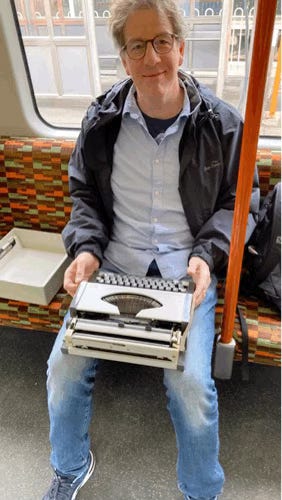Why I bought a typewriter, and what I use it for
Sometimes, in fact quite often, the computer and iPhone do my head in.
Yesterday I took my AEG Olympia Traveler Deluxe typewriter across London to a specialist.
I don’t use it often, but sometimes I can’t use anything else. The computer simply does my head in, with the sheer variety of options it offers. I can send someone an email, record a video, post something here, or there, or there, or there, or of course THERE (etc).
Even if I try to turn notifications off, something gets through.
So increasingly I write in my notebook with a pen, and / or use my 5 kilo “laptop” (pictured). I can bash out the words without having the option to cut and paste - so I don’t try to keep perfecting things as I go along.
(I typed three four five six seven eight different ideas here, on this line, before settling on this particular sentence in brackets. What a waste of time. In the olden days, with a typewriter, I’d have thought longer before typing and also spent longer thinking about the edit.)
==
Why do I have a typewriter? I’m not that old. I came into journalism long after computers - let alone electronic typewriters - had replaced these things.
I bought it years ago to write a story for the Sunday Times about living a very low-impact life (low use of carbon, for ecological reasons). I wrote the story on a typewriter to save the marginal amount of electricity involved in using a computer.
It was a silly point, just to make a point, but I found that I enjoyed it. The space it gave me to think.
I wrote the first version, went over it with a red pen, and typed a second cleaner version, which I then hand-delivered to the paper on my bicycle (low impact).
So anyway, I took the analogue laptop on the Tube yesterday to see a specialist. And I took the lid off to inspect the inside of it just as a man from Transport for London came through picking up litter. (The train was at a terminus, five minutes before departure time.)
As soon as he saw the typewriter he said, “I am SO happy to see this! I had one in Nigeria.”
He didn’t just mean that he had a manual typewriter, but an actual Olympia AEG Traveller Deluxe.
I was very happy to hear this, and asked him to take my photo.
==
Contrary to expectations, I seem now to have written something on my computer without getting utterly distracted and lost by all the options available.
There’s a lot more to say about typewriters and typing, but I’ll leave that for another time. Thanks for reading. Your attention is precious to me.



Technology for decades, under the more general ideology of 'progress', is sold to us essentially 'to save time'. Presumably saving time to do 'higher things' (like meditate) and/or to indulge in some things we'd really prefer to be doing (like a hobby, going for a walk, or sitting in a café). What actually happens is we feel pressure to get more stuff done we're not overly interested in, in the belief we are earning more brownie points for some future reward.
Using a typewriter definitely creates a 'think-before-you-type' mind-set which, I think, produces a different end-product. I find this with making sculptures, and weaving -- the slowness of a process allows more time for us to notice 'an intervention of the gods', a creative surprise, which gives the end product of a project we are working on, a different and more 'human' feel.
I write my poetry first with a fountain-pen on paper, have lots of arrows and crossings-out, and then type it up - but then type it up on my lap-top (and yes, still using the back-space-deleting button a lot).
I'd be interested to know if there's a way to count the number of times I press "backspace" on my apple keyboard. (Seven so far for this comment.) The backspace on my typewriter is a pain in the bum, so I really tend to avoid it.
Backspace on typewriter? It tends to come in handy for typing a load of XXXXXs over faulty words, or for filling in a letter that I have not pressed hard enough to register on the paper, in my haste to type.